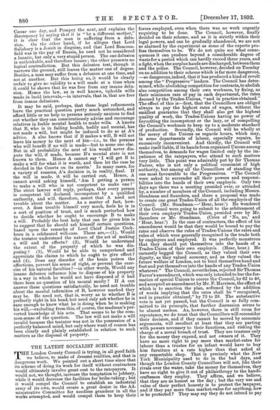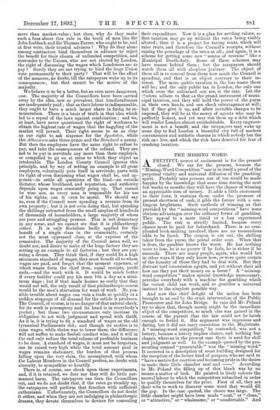Caesar one day, and Pompey the next, and explains the
forces employed, even when there was no work urgently discrepancy by saying that it is " by a different mother," requiring to be done. The Council, however, finally it is clear that the man is suffering from a delu- decided on their scheme, and as it is strictly within their sion. On the other band, if he alleges that Lord legal powers, and can be gradually abandoned, we are not Salisbury is a Jesuit in disguise, and that Lord Beacons- so alarmed by the experiment as some of the experts pro- field was in the pay of Russia, he need not be considered fess themselves to be. We do not quite see what conse- a lunatic, but only a very stupid person. The one delusion quences it can produce beyond a considerable degree of is unthinkable, and therefore insane ; the other presents no waste for a period which can hardly exceed three years, and logical contradiction. But this delusion test, though it a fight, when the surplus hands are discharged, between them narrows the ground, still leaves the matter one of degree. and the police. The Council, however, decided on Tuesday Besides, a man may suffer from a delusion at one time, and on an addition to their scheme which is far more dangerous, not at another. But this being so, it would be clearly —so dangerous, indeed, that it has produced a kind of revolt unfair to give no validity to a will made at a time when among the " Progressive " leaders. The Council has deter- it could be shown that he was free from any insane delu- mined, while abolishing competition for contracts,to abolish sion. Hence the law, as is well known, upholds wills also competition among their own workmen, by fixing, as made in lucid intervals,—in intervals, that is, that are free their minimum rate of pay in each department, the rates from insane delusions. decreed by the Trades-Unions, " and in practice obtained." said, perhaps, that these legal refinements The effect of this is—first, that the Councillors are obliged leave the practical question pretty much untouched, and always to pay the highest rates of wages, without the afford smallest guarantee that they shall also get the highest fford little or no help to persons seriously anxious to find ll out whether they can conscientiously advise and encourage quality of work, the Trades-Unions having no power of relatives boycotting in feeble mental health to make wills. A knows the incompetent or the lazy, or of compelling that B, who is in failing health, bodily and mental, has the Council's workmen to keep up to a moderate standard of production. Secondly, the Council will be wholly at not made a will, but might be induced to do so at A's advice. A also knows that if B makes a will, B will not the mercy of the Unions as regards hours, which may, in leave his money to the next of kin—i.e., to the persons some departments of labour, especially repairs, be excessively inconvenient. And thirdly, the Council will make itself liable, if its hands form organised Unions among themselves, to demands for wages limited only by the im- very little. This point was admirably put by Sir Thomas Farrer, who is not only a political economist of high the Councillors of standing the were asked to surrender all their powers and responsi- rates and observe the rules of Trades-Unions the rates and that they should put themselves into the hands of a future welfare of London, not to bind themselves hand and for the money they expend, and not owners of it. They have no more right to pay more than market-rates for THE LATEST SOCIALIST SCHEME. labour than a trustee for an infant would have to buy more than market-value ; but then, why do they make such a fuss about this rule in the teeth of men like Sir John Lubbock and Sir Thomas Farrer, who ought to be, and at first were, their trusted advisers ? Why do they alone among contractors bind themselves in advance to reject the benefit for their clients of unlimited competition, and surrender to the Unions, who are not elected by London, the right of discussing the wages which Londoners are to pay ? Surely they are not trying to bind the huge Union vote permanently to their party ? That will be the effect of the measure, no doubt, till the ratepayers wake up to its consequences ; but that cannot be the motive of the majority.
We believe it to be a better, but an even more dangerous, one. The majority of the Councillors have been carried away by the idea, now so prevalent, that handicraftsmen are inadequately paid ; that as their labour is indispensable, they ought to have a much larger share in fixing its re- muneration. There is a basis of truth in that idea which led to a repeal of the laws against combination ; and we, at least, have never questioned the right of workmen to obtain the highest rate of wages that the haggling of the market will permit. Their right seems to us as clear as our right to ask sixpence for the Spectator, while the Athenaeum asks three-pence and the Standard a penny. But then the employers have the same right to refuse to pay, and take the consequences of the refusal. They are not to be put in servitude any more than their employes, or compelled to go on at rates to which they object as intolerable. The London County Council ignores this principle, and by way of setting an example to all great employers, voluntarily puts itself in servitude, parts with its right of even discussing what wages shall be, and ap- points—to settle all questions of the kind—an outside dictator, whose livelihood, and reputation, and authority depends upon wages constantly going up. That cannot be wise nor, as every man is responsible for his use of his rights, can it even be moral. We should say so, even if the Council were spending a revenue from its own property ; but it is not even doing that, but spending the shillings extracted from the small surplus of hundreds of thousands of householders, a large majority of whom are poor and struggling persons. This is not democracy in any sense, and we cannot see that it is philanthropy either. It is only Socialism badly applied for the benefit of a single class in the community, certainly not the most oppressed class, at the expense of the remainder. The majority of the Council mean well, we doubt not, and desire to make of the huge factory they are setting up an example to all factories ; but they are pur- suing a dream. They think that, if they could fix a high minimum standard of wages, they must benefit all to whom wages are paid, and forget that the moment expenses, of which wages form the chief item, equal receipts, profit ends,—and the work with it. It would be much better if every builder could pay his men 10s. a day as a mini- mum wage ; but if that made houses so costly that they would not sell, the only result of that philanthropic course would be the men's starvation for want of work. No pos- sible trouble about wages can ruin a trade so quickly as a sudden stoppage of all demand for the article it produces. The Council, of course, is in no danger of that natural check, for its work is peremptory and its hand is in everybody's pocket.; but those two circumstances only increase its obligation to act with judgment and spend with thrift. As it is, it is trying to fix a standard of wages as the old tyrannical Parliaments did ; and though its motive is to raise wages, while theirs was to lower them, the difference will not suffice to make foolish conduct wise, and it will in the end only reduce the total volume of profitable business t) be done. A standard of wages, it must not be forgotten, can be raised very high while the total amount paid in wages remains stationary, the burden of that process falling upon the very class, the unemployed, with whom the Labour Members in the Council profess, no doubt with sincerity, to sympathise so heartily.
There is, of course, one check upon these experiments, and, if it is retained, we dare say they will do little per- manent harm. The ratepayers can turn the Councillors out, and we do not doubt that, if the rates go steadily up, the ratepayers will perform that function with sufficient enthusiasm. Unfortunately, the Councillors do not doubt it either, and when they are not indulging in philanthropic dreams, they devote themselves to devices for concealing their expenditure. Now it is a plan for settling values, so that taxation may go up without the rates being visibly altered ; then it is a project for taxing rents, which will raise rents, and therefore the Council's receipts, without raising the poundage of the rates at all ; and again, it is a scheme for getting some new " source of revenue " like a Municipal Death-duty. Some of these schemes may have reason behind them ; but the ratepayers should watch them all with sleepless jealousy. The object of them all is to conceal from them how much the Council is spending, and that is an object contrary to their in- terest. The more public taxation is, the less waste there will be ; and the only public tax in London, the only one which even the unlearned can see, is the rate. Let the doctors adhere to that as the grand instrument of muni- cipal taxation, and they will hold the power of the purse in their own hands, and can check extravagance at will; but if they give it up, and allow invisible charges to be imposed, they will be at the mercy of agents who may be perfectly honest, and yet may run them up a debt which will render London almost uninhabitable. Every improve- ment is not a benefit, and the ratepayers may wake up some day to find London a beautiful city full of modern conveniences and aesthetic charms in which nobody but the rich can live, and which the rich have deserted for fear of crushing taxation.







































 Previous page
Previous page